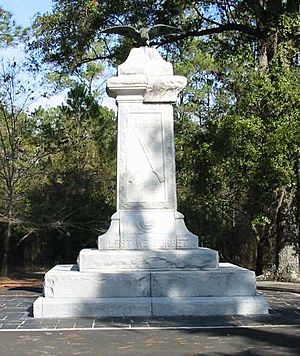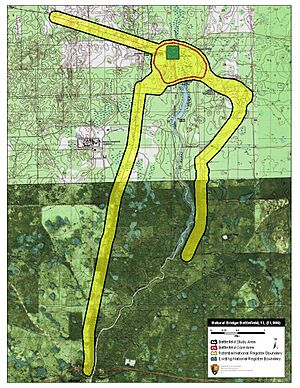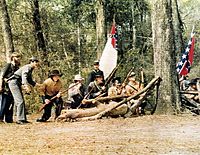Battle of Natural Bridge facts for kids
Quick facts for kids Battle of Natural Bridge |
|||||||
|---|---|---|---|---|---|---|---|
| Part of the American Civil War | |||||||
 Natural Bridge Monument |
|||||||
|
|||||||
| Belligerents | |||||||
| Commanders and leaders | |||||||
| John Newton | Sam Jones William Miller |
||||||
| Units involved | |||||||
| 2nd Florida Cavalry Regiment 2nd U.S. Colored Infantry 99th U.S. Colored Infantry |
1st Florida Militia 5th Florida Cavalry Battalion Kilcrease Artillery Dunham’s Battery Abell's Battery Company A, Milton Light Artillery Barwick’s Company Reserves Hodges' Company Reserves Companies A, B, and F; Florida Reserves Reinforcements from Georgia |
||||||
| Strength | |||||||
| 700 | 1,000 | ||||||
| Casualties and losses | |||||||
| 148 total 21 killed 89 wounded 38 captured |
26 total 3 killed 23 wounded |
||||||
The Battle of Natural Bridge was a fight during the American Civil War. It happened on March 6, 1865, near Tallahassee in what is now Woodville, Florida. A small group of Confederate soldiers and volunteers stopped a larger Union force.
These Confederate defenders included teenagers from the Florida Military and Collegiate Institute. This school later became Florida State University. They used dirt walls, called breastworks, to help protect themselves. They stopped a group of United States Colored Troops from crossing the St. Marks River at a place called Natural Bridge.
The Natural Bridge is a special part of the St. Marks River. For about a quarter of a mile (0.4 km), the river flows underground. It drops into a large hole in the ground, then comes back up later.
Contents
The Battle Begins
Union Plan to Attack
The Union Army wanted to find and defeat Confederate troops. These Confederate soldiers had attacked places like Cedar Key and Fort Myers. Union General John Newton led this mission. He planned a joint attack with the Union Navy.
The Union Navy had trouble getting their ships up the St. Marks River. But the Union Army kept moving forward. They found one bridge that had been destroyed. So, before dawn on March 6, they decided to try crossing the river at Natural Bridge.
Fighting at the Bridge
The Union troops first pushed the Confederate forces back. But they couldn't push them away from the bridge itself. Confederate forces, led by Brigade General William Miller, were ready. They used their strong breastworks to guard all ways to the bridge.
The fighting at Natural Bridge lasted most of the day. The Union troops tried three times to take the bridge. Each time, they failed. Finally, they had to retreat to the safety of their ships.
Heroes of the Battle
Sailors from the Union ship USS Hendrick Hudson also fought in this battle. Two of them, Seaman John Mack and Coxswain George Schutt, were given the Medal of Honor. This is a very high award for bravery.
Student Soldiers' Legacy
Because students from the Florida Military and Collegiate Institute fought here, Florida State University has a special honor. Their ROTC program is one of only four Army ROTC programs with a battle streamer from the Civil War. This streamer shows their part in the battle. The Air Force ROTC unit at FSU also displays this same battle streamer.
Remembering the Battle
The Natural Bridge Monument
Today, the battle site is a park called Natural Bridge Battlefield Historic State Park. There is a monument there that tells the story of the battle. It says that the monument was put up in 1921. It honors the brave men and boys who fought.
The monument says these fighters saved Tallahassee. Tallahassee was the only Southern capital not captured by the Union during the Civil War. However, Austin, Texas was also not captured. It never had enemy troops close to it.
Annual Reenactment Event
Every year, on the first weekend of March, there's a special event at the park. It honors everyone who fought in the Battle of Natural Bridge. There is also a reenactment of the battle. People dress up as Union soldiers, Confederate soldiers, and civilians.
This event is free for everyone to visit. The Civil War Trust, which is part of the American Battlefield Trust, has helped save part of the battlefield. They have protected 110 acres (45 hectares) that are now part of the state park.
 | Jackie Robinson |
 | Jack Johnson |
 | Althea Gibson |
 | Arthur Ashe |
 | Muhammad Ali |



